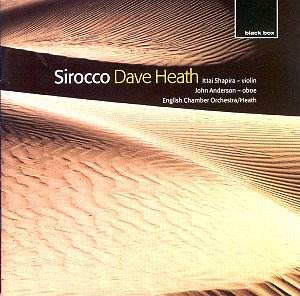Dave Heath, born in Manchester, has been handsomely
treated here with three substantial multi-movement orchestral works
each of three movements. These are interspersed with three single movement
pieces.
Sirocco proceeds furiously and peacefully.
The furious sprint of some of the music is reminiscent of Bartók
though Heath is not as thorny as late Bartók and he is more lyrical.
Despite its declared ‘roots’ it is not specially 'ethnic' in a North
African sense. Heath instead successfully articulates the essentials
of the Arabian experience - loneliness, the hint of the strange swaying
caprice that Westerners associate with the region all meshed with a
modern approximation of The Lark Ascending. The work is played
by its dedicatee Ittai Shapira. Heath has essayed Celtic works before
- the Celtic Concerto was written for Cleo Gould in 1994.
She premiered it with the BT Scottish Ensemble. Shapira lays into
this work with a will and the Ceilidh first movement has insistent
spiritual echoes of Vaughan Williams' Violin Concerto and Holst's
Double Violin Concerto. Just as with Sirocco the middle movement
(Lament for Collessie) is the longest - about as long as the
flanking movements put together. It speaks most movingly of Heath's
sadness at leaving the township of Collessie in Fife, Scotland where
he had made some very good friends. As the movement proceeds it becomes
more and more like a contemplative caoine. The Cooper of Clapham
finale is hoarsely busy - and folksy though not specially Scottish
- again we are talking Holst in neo-classical vein as in the Fugal
Concerto or the Fugal Overture. By the way, Cooper is the
British flute maker Albert Cooper - an obsessive perfectionist.
Home From the Storm derives from a melody
Heath wrote in 1984 but orchestrated for these sessions. Its inspiration
is one of Heath's heroes, the flautists William Bennett who plays the
piece here. Rather as Rautavaara added sound effects (birdsong) to his
Cantus Arcticus so Heath adds tapes of the sounds of rain and
wind to add atmosphere. It makes for a meltingly lovely piece. You can
think of it as a cousin to the lyrical sections of Philippe Sarde's
score for Polanski's Tess and Richard Rodney Bennett's music
for Far From the Madding Crowd and Lady Caroline Lamb.
The Sapphire is coloured by the sound
of the bagpipes - more clamantly Caledonian than in the Celtic concerto
- through John Anderson's oboe solo. The piece is sweetly good tempered
and mellow. The title derives from the name of Heath's daughter, Naima
Sapphire. Lochalsh was another work written for Clio Gould
but here played by Ittai Shapira. It is a display piece which puts the
soloist through most of the paces. There is a passing resemblance to
the wild theme from Ravel's Tzigane. The composer refers to harmonies
influenced by those of John Coltrane.
Both Home From the Storm and The Sapphire
would make for perfect competition pieces no doubt arranged 'down'
for piano accompaniment.
The performance of Requiem recorded here
is from a live concert on 25 August 2001. It is an extremely unconventional
work with much of it spoken at first and no instrumental accompaniment.
In fact the only instrument is the organ. It is a Requiem for Paul Medrington,
a close friend of the Heath children, Liam and Calum, who died aged
five in a tragic accident. The Requiem is earthy - reflecting
not only the mother's loss but also her anger with those who she asked
to watch him. The soprano voice is that of the mother; the treble that
of Paul. This is an extremely moving work and I recommend it strongly.
What it does it does with simple means rather than sophistication.
This disc would have been a natural for reviewer Neil
Horner but I had a sneaking suspicion I would warm to this music.
Thanks are due to the Scottish Arts Council who funded
this recording. Let us hope that the SAC can also be relied on to support
other revivals. Are the SAC even aware of Eric Chisholm's turbulent
pair of 1930s symphonies (Chisholm did so much to place Scotland on
the international cultural map during the 1920s and 1930s) and Hindustani
piano concerto. They could also profitably turn their funding support
towards Ronald Stevenson's music - commissioning from him the completion
of the great Ben Dorain epic and recording the violin concerto
and the cello concerto.
Perhaps more practical would be a similar CD of the
orchestral works of Eddie McGuire such as Source, Calgacus
and the utterly masterly Gaelic song cycle which I remember Anne
Lorne Gillies singing with the BT Scottish Ensemble in Stornoway
at the Nicolson Institute in the late 1980s.
Rewarding stuff in an accessible though not dumbed
down way.
Rob Barnett
MORE INFORMATION
www.dcheath.co.uk

